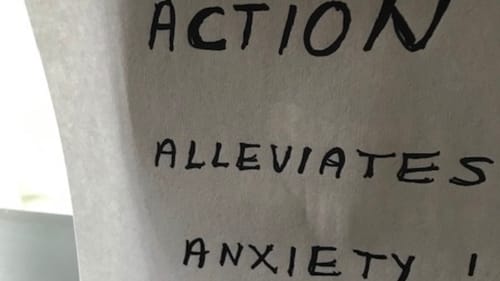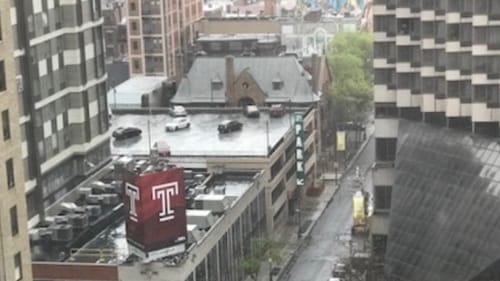Stay in the Loop
BSR publishes on a weekly schedule, with an email newsletter every Wednesday and Thursday morning. There’s no paywall, and subscribing is always free.
Anxiety, meet COVID
How does life in the pandemic feel with a lifelong anxiety disorder?

Someone once told me, “You could be the poster child for anxiety.” I felt offended and misjudged, but later I acknowledged there was perhaps some truth in that statement. Anxiety has plagued me throughout my life. In elementary school, debilitating anxiety led me to underperform on standardized tests. In high school and college, I obsessed over getting straight A’s. As an adult, I experienced panic attacks.
Even before the COVID-19 pandemic, I worried and agonized over everything and anything. Racing, uncontrollable thoughts kept me up at night. I catastrophized, losing all perspective as my mind inflated minor setbacks to insurmountable crises.
The benefits of anxiety
So, as someone who is no stranger to clinical anxiety and worst-case-scenario consciousness, how am I faring in the face of a dangerous virus, insidious and unpredictable in its ways, that quickly caused a pandemic and killed people I know? In the at-risk group of people over 60, living alone in my Philadelphia apartment, and refusing anxiety meds, I was astonished when news about the novel coronavirus didn’t ratchet up my anxiety. As ridiculous as it may seem, I’ve experienced more stress planning a trip abroad or waiting to hear from an editor. I’m even logging more hours of shut-eye these days. Could my history of chronic anxiety have given me some immunity against the worry unleashed by COVID-19?
This is not to say I haven’t had moments of overreaction. Whenever I experience sudden, inexplicable chills, even if they soon disappear, I am convinced I am fighting off the virus. I also started self-quarantining and social distancing weeks before it became the mandated norm. “My life is more important than a bagel and cream cheese,” I told a friend who wanted to head to a café with me.
When overreaction is just right
In the past seven weeks, I have ventured outside only to go to Trader Joe’s every 10 days. I feel safe and in control in my apartment, where no COVID-19 droplets invisibly float, looking to latch onto my respiratory cells.
For once, I don’t feel like an irrational person. Now that we all find ourselves in a surreal kind of limbo, everyone is overreacting and anxious. Isn’t that preferable to being in denial or risking your life and the lives of others?
We all should applaud the straight-talking Dr. Anthony Fauci for his take on precautions people took early in this crisis. “People sometimes think that you’re overreacting. I like it when people are thinking I’m overreacting because that means we’re doing it just right,” he told the nation.
The three A’s
I am also guided by the words of my first therapist: “Action alleviates anxiety.” The three A’s have become my mantra, pushing me to become proactive and not succumb to my usual doom-and-gloom mindset.

For starters, I educate and calm myself by relying on medical professionals like Dr. Fauci and CNN’s Dr. Sanjay Gupta for the latest facts about the pandemic. I steer clear of Donald Trump and his cronies, who only sow confusion, misinformation, and anxiety.
As a former New Yorker concerned about my old hometown, I always listen to Governor Andrew Cuomo’s press briefings. Even with his grim announcements of the spike in COVID-19 deaths, I find solace in his firm grasp of reality. Better to hear the truth than for me to conjure up my own anxiety-fueled doomsday scenarios.
I wash my hands with soap and water as I mentally mark two renditions of “Happy Birthday.” I use sanitizer and Clorox wipes, don’t touch my face, observe distancing, shelter in place, and stock up on food so I can stay home more. Since latex gloves have disappeared from stores, I use junk mail to wipe doorknobs and elevator buttons. Even though my building has a two-person limit per elevator, I wait for an empty one. Every precaution makes me feel less anxious because I am doing my part to self-protect and prevent community spread.
I keep busy with paperwork, writing, reading, even cleaning and laundry, anything that distracts from COVID-19 anxiety.
I constantly reach out by phone to family and friends. As a result, our relationships have deepened as we commiserate, vent, and even laugh. I now find that people who had been sympathetic but not necessarily empathetic to my anxieties in the past now listen attentively and non-judgmentally when I share that I toss grocery bags on the terrace for five days after using them or that I disinfect the mail.

Lucky to be in Philly
I feel lucky to be living in Philadelphia during this pandemic. Whenever I walk to the grocery store, people maintain a respectful distance and wear masks. Shopping at Trader Joe’s, one of the few stores to be proactive even before the lockdown by providing sanitizer and monitoring the flow of customers, is stress-free. Although a newcomer to the city, I take pride in the compliance of my fellow Philadelphians and the concern at Trader Joe’s for the health of its customers and staff.
As a veteran anxiety sufferer, I could easily freak out over the uncertainties that rise up to torment me. Would I get to the hospital in time if I needed it? Would the overtaxed hospital have a bed for me in the ICU or a ventilator as I gasp for air? Does anyone even know how long this outbreak will last?
“Action alleviates anxiety,” I remind myself.
As I start to spiral downward, I make a beeline to my window facing Broad Street. As I look down at the once-bustling thoroughfare, now devoid of people and traffic, I feel hope in the quiet and in knowing that we Philadelphians have each other’s backs. And yes, I feel certain that, though we’re in this “new abnormal” for the long haul, together, we will soldier through and emerge, battle-worn but triumphant.
Sign up for our newsletter
All of the week's new articles, all in one place. Sign up for the free weekly BSR newsletters, and don't miss a conversation.

 Fredricka R. Maister
Fredricka R. Maister